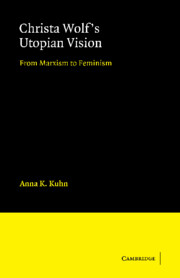Book contents
- Frontmatter
- Contents
- Acknowledgments
- List of abbreviations
- 1 Introduction: setting the context
- 2 Beginnings: experimentation with Socialist Realist paradigms
- 3 Christa T.: the quest for self-actualization
- 4 Patterns of Childhood: the confrontation with the self
- 5 No Place on Earth: revision of the Romantic heritage
- 6 Cassandra: myth, matriarchy, and the canon
- 7 In lieu of a conclusion. Störfall: the destruction of utopia?
- Notes
- Bibliography
- Index
5 - No Place on Earth: revision of the Romantic heritage
Published online by Cambridge University Press: 18 September 2009
- Frontmatter
- Contents
- Acknowledgments
- List of abbreviations
- 1 Introduction: setting the context
- 2 Beginnings: experimentation with Socialist Realist paradigms
- 3 Christa T.: the quest for self-actualization
- 4 Patterns of Childhood: the confrontation with the self
- 5 No Place on Earth: revision of the Romantic heritage
- 6 Cassandra: myth, matriarchy, and the canon
- 7 In lieu of a conclusion. Störfall: the destruction of utopia?
- Notes
- Bibliography
- Index
Summary
In 1976 Wolf Biermann, the dissident poet and songwriter whose satiric verses had long been a thorn in the side of Party officials and who had been banned from performing in East Germany since 1965, was refused reentry into the GDR after a West German tour. On the following day, 17 November 1976, a group of concerned intellectuals including the writers Stephan Hermlin, Christa Wolf, her husband Gerhard Wolf, and Sarah Kirsch sent an open letter of protest to Neues Deutschland, the official Party newspaper, and to the French news agency AFD. Implicitly referring to Honecker's lifting of taboos, they argued that the GDR, having passed out of the initial developmental stages of socialism, was sufficiently established to sustain internal criticism and urged the government to reconsider its sanctions against Biermann. The Biermann petition, the first public group protest in the GDR, met with reprisals ranging in severity from expulsion from the SED (for Gerhard Wolf) to censure by the Party (for Christa Wolf and Hermlin). Two months later, on 20 December, Christa Wolf and other prominent writers including Jurek Becker, Günter de Bruyn, Sarah Kirsch, Ulrich Plenzdorf, and Volker Braun were expelled from the board of directors of the Berlin branch of the writers' union.
Inconsistent as the measures taken against the petitioners were, the message was unequivocal: the Party would not tolerate what it perceived as a public challenge to its authority.
- Type
- Chapter
- Information
- Christa Wolf's Utopian VisionFrom Marxism to Feminism, pp. 138 - 177Publisher: Cambridge University PressPrint publication year: 1988

